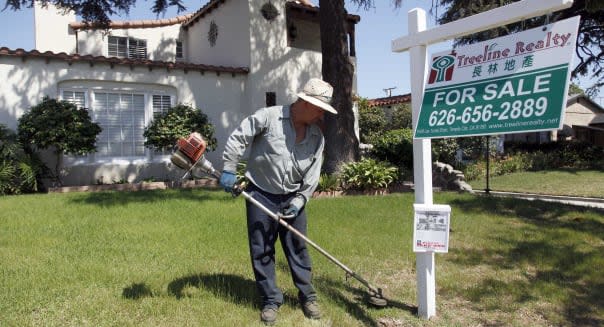Home Prices Heat Up in May as Pace of Gains Cools

By Leah Schnurr
NEW YORK -- U.S. single-family home prices rose in May, suggesting the housing market recovery continued during the spring buying season though the pace of gains cooled compared to the month before, a closely watched survey showed on Tuesday.
The S&P/Case Shiller composite index of 20 metropolitan areas gained 1 percent on a seasonally adjusted basis, shy of economists' forecast for a 1.5 percent increase. That marked a slower pace than April's 1.7 percent rise.
On a non-adjusted basis, prices rose 2.4 percent.
Compared to last May, prices also fell short of expectations, rising 12.2 percent from a year earlier. Still, it was the biggest annual gain since March 2006, matching a record set in April.
The report was unlikely to alter economists' views that the housing sector's recovery is progressing, making it a bright spot for the economy. The dollar erased losses against the yen, but beyond that, financial markets saw little reaction to the data.
Sponsored Links
All 20 cities rose on a yearly basis, led by a 24.5 percent surge in San Francisco. Two cities -- Dallas and Denver -- reached record levels, surpassing their peaks reached during the housing boom. It was the first time any city has racked up a new all-time high, the survey said.
"Home prices continue to strengthen," David Blitzer, chairman of the index committee at S&P Dow Jones Indices, said in a statement.
"The overall report points to some shifts among various markets: Washington, D.C., is no longer the standout leader and the eastern Sunbelt cities, Miami and Tampa, are lagging behind their western counterparts."
A tightening of inventory available for sale, fewer foreclosures and buying from investors has helped push prices higher during the past year-and-a-half as the battered housing sector has gotten back on its feet.
But a potential hurdle has emerged recently in the form of higher mortgage rates, as borrowing costs have risen in the wake of the Federal Reserve's plan to start winding down its economic stimulus later this year if the economy progresses as expected.
Still, rates remain low by historical standards and most economists don't expect them to derail the housing market.
May's home price data likely didn't capture the rise in rates as the contracts to purchase would have been signed before rates began increasing, Bank of America-Merrill Lynch wrote last week.
%Gallery-187664%

